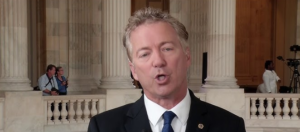Senator Rand Paul proposes legislation to eliminate the federal Department of Education, advocating for decentralized educational decision-making and igniting a national debate on education reform and parental rights.
Senator Rand Paul's Push to Abolish the Department of Education Stirs Debate

Senator Rand Paul's Push to Abolish the Department of Education Stirs Debate
In a bold legislative move, Senator Rand Paul aims to dismantle the federal Department of Education, promoting state and local control over education.
In an exclusive interview, Senator Rand Paul (R-KY) is making waves on Capitol Hill with bold legislation aimed at completely eliminating the federal Department of Education—a move he says would return control of education to states, local communities, and families, where it rightfully belongs.
Speaking with One America News Network’s John Hines, Paul argued that the U.S. has spent decades and billions of dollars on a bloated federal education bureaucracy, with little to no improvement in student outcomes. He believes the centralization of education policy has only created inefficiency, federal overreach, and one-size-fits-all mandates that don’t reflect the needs of local students or parents.
“America would be better off if we put education decisions back into the hands of the states,” Paul said. “Local schools know their students far better than any federal agency ever could.”
His bill proposes a full dismantling of the Department of Education, redirecting education responsibilities and funding to individual states. Supporters of the plan argue it would lead to more innovation, greater accountability, and stronger parental involvement, while opponents claim it would risk creating uneven education standards.
Still, with national frustration over education policy, parental rights, and federal mandates continuing to build, Paul’s message is resonating with a growing number of Americans who believe the future of education shouldn’t be decided in Washington, D.C.
Speaking with One America News Network’s John Hines, Paul argued that the U.S. has spent decades and billions of dollars on a bloated federal education bureaucracy, with little to no improvement in student outcomes. He believes the centralization of education policy has only created inefficiency, federal overreach, and one-size-fits-all mandates that don’t reflect the needs of local students or parents.
“America would be better off if we put education decisions back into the hands of the states,” Paul said. “Local schools know their students far better than any federal agency ever could.”
His bill proposes a full dismantling of the Department of Education, redirecting education responsibilities and funding to individual states. Supporters of the plan argue it would lead to more innovation, greater accountability, and stronger parental involvement, while opponents claim it would risk creating uneven education standards.
Still, with national frustration over education policy, parental rights, and federal mandates continuing to build, Paul’s message is resonating with a growing number of Americans who believe the future of education shouldn’t be decided in Washington, D.C.






















